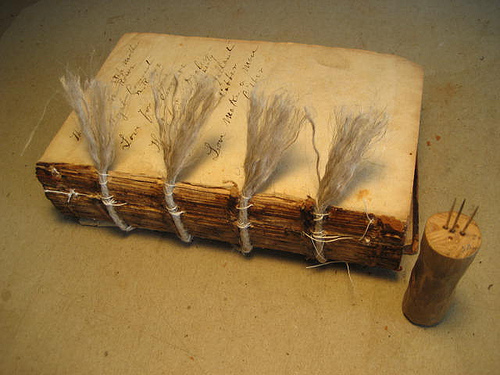FWP:
SETS
GAZE: {10,12}
INDEPENDENCE: {9,1}
TAMASHA: {8,1}
Usually it's the beloved who shows 'negligence', rather than the lover; but don't forget {182,1}, in which being a 'negligence-{lover/friend}' seems to be a point of pride for the lover.
The imagery in the second line-- the gaze, and the thread used for the stitched binding of a book-- has been discussed in {10,12}, with other examples. But this is the only verse to add 'eyelashes' to the mix. The eyelashes of closed eyes easily evoke the stitched binding of a book. But the thread that does this stitching is-- in a maneuver somewhat hard to visualize-- the gaze itself. The gaze is imagined to be, above all, lowered-- it occupies itself in twisting in and around the eyelashes, 'binding' rather than 'opening' the book of sight.
And all this is done exemplarily, deliberately, 'through' the speaker himself. Thus the present verse seems to be part of what I call the 'independence' group-- a set of verses that endorse the use of one's own resources, even if inferior, rather than those of others, no matter how desirable. In the present verse the whole world becomes a single 'spectacle' of such a nature than not only it but even its 'title' or introduction-- and not only its title, but even whatever 'lesson' might be provided by that title-- should be regarded with disregard, heeded with heedlessness, treated with disdain or 'negligence'.
Really too many abstractions have been too tortuously linked together, so the verse remains both inert and obscure.
The 'book' wordplay-- 'lesson', 'title', 'thread', 'stitched-binding'--
is of course conspicuous as well.

Nazm:
That is, my gaze has become the thread of the stitched binding of the eyelashes. The result is that because of being fond of negligence, it does not emerge from the eyes; and to take a lesson from the spectacle of the world is better with negligence. And he has brought in the world 'title' in order to create exaggeration-- that is, the whole spectacle is a volume, and who's in the mood to look at it? Here he's negligent about looking even at the title of the spectacle. (212)
== Nazm page 212